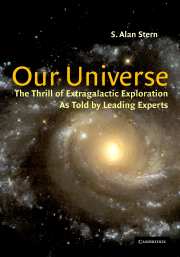Book contents
- Frontmatter
- Contents
- Preface
- The frontier Universe: At the edge of the night
- Part I Revealing a Universe
- 1 Mapmaker, mapmaker make me a map
- 2 Looking back in time: Searching for the most distant galaxies
- 3 So we've lost the mission? The Big Bang and the Cosmic Background Explorer
- 4 Computational adventures in cosmology
- Part II Denizens of the deep
- Plate section
4 - Computational adventures in cosmology
Published online by Cambridge University Press: 03 September 2009
- Frontmatter
- Contents
- Preface
- The frontier Universe: At the edge of the night
- Part I Revealing a Universe
- 1 Mapmaker, mapmaker make me a map
- 2 Looking back in time: Searching for the most distant galaxies
- 3 So we've lost the mission? The Big Bang and the Cosmic Background Explorer
- 4 Computational adventures in cosmology
- Part II Denizens of the deep
- Plate section
Summary
Nick Gnedin was raised in Russia. He received his Master's degree from the Leningrad (now St. Petersburg) Polytechnical Institute, and his PhD at Princeton. For two years he worked as a Research Assistant at the Astrophysical Department of the Ioffe Institute for Physics and Technology (Leningrad, USSR). In May 1991 he was invited to Princeton University, and has remained in the United States ever since. Most recently, Nick has been a professor in the Astrophysical and Planetary Sciences Department of the University of Colorado. He and his wife Marianna are raising their daughter Nina in the Rocky Mountains while Nick teaches and continues to pursue his research love—numerical simulations of the evolution of the Universe since its early youth.
The greatest happiness of the thinking man is to have fathomed what can be fathomed, and quietly to reverence what is unfathomable.
GoetheEver since an animal looked up to the night sky, wondered at the brilliance of stars and the vast depth of space, and in the act of doing so became a human being, the Universe beyond our immediate locale was always a subject of human curiosity.
What are we in this world, and how do we relate to the immense emptiness around us that we call space? How did the Universe come to existence?
- Type
- Chapter
- Information
- Our UniverseThe Thrill of Extragalactic Exploration, pp. 55 - 70Publisher: Cambridge University PressPrint publication year: 2001

